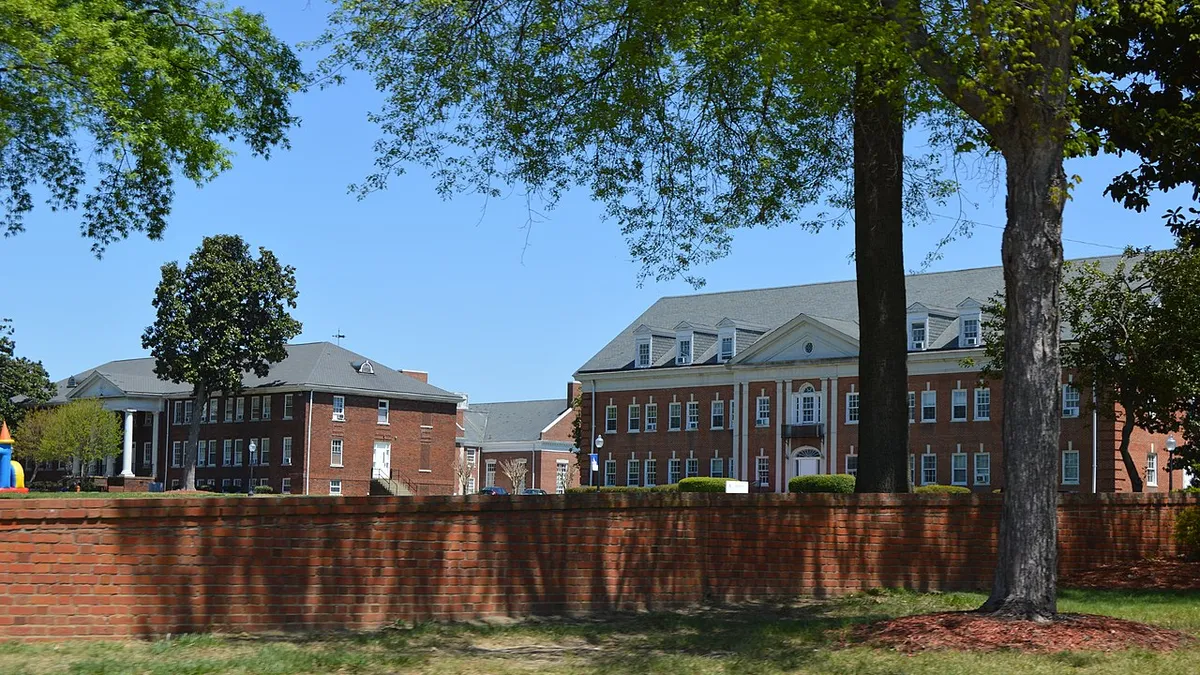Dive Brief:
- Bennett College, a historically black women's college in North Carolina that must raise $5 million dollars by Feb. 1 to retain its accreditation, was brought more than halfway to that goal last week by two $500,000 donations, the News & Record reported.
- One came from a North Carolina grant-making group, the Z. Smith Reynolds Foundation, and the other came from the Papa John's Foundation, the charitable arm of the pizza delivery company whose founder last year caught flak for racist comments. Both have said they would help find additional donors.
- Declining enrollments have sapped the college's coffers, causing consecutive years of budget deficits and putting it at risk of permanently losing accreditation.
Dive Insight:
As small liberal arts colleges make headlines for closing due to financial distress, HBCUs are proving to be particularly vulnerable. The relative rarity of massive gifts to HBCUs like the pair Bennett College received last week help explain why.
In 2017, HBCUs accounted for just two of the 462 gifts of $1 million or more to colleges and universities, Inside Philanthropy reported, noting that their alumni tend to have less accumulated wealth than those of Ivy League colleges, who tend to be major donors.
Additionally, non-alumni donors have largely not given to HBCUs. "There's racism involved in acquiring funds," University of Pennsylvania Professor Marybeth Gasman told Bloomberg, noting that in the past "funders did not trust African Americans to manage their money, so they didn't give."
Big gifts can help bulk up an endowment or funnel funds directly to programs in need of support. And both private and public colleges are raking them in.
Over time, smaller gifts mean less wealth for HBCUs relative to other institutions of their stature. Bloomberg reported that as of 2016, no HBCU had an endowment over $1 billion, with the wealthiest, Howard University, at $578 million. Bigger endowments mean colleges can spend more to recruit students and be less financially dependent on tuition revenue. They can also be critically important for obtaining capital and making other long-term investments.
Combine that with other headwinds aimed at HBCUs — historically inequitable state funding, vulnerability to racism in lending and a shrinking pool of prospective students as higher ed desegregates — and several have closed or, like Bennett, are at risk of it. Even Howard University was recently put on severe heightened cash monitoring status by the Education Department, which cited a lack of internal controls and issues reconciling funding and records.
Enrollment across 101 HBCUs fell 10% from 2010 to 2015 compared to 4% at all U.S. colleges, according to a report by the Atlanta Journal-Constitution. During that time, 20 HBCUs saw their enrollment drop by more than 25% while just 22 saw it rise at all.
Writing for Inside Higher Ed, Alvin Schexnider, former Chancellor at Winston-Salem State University, advises HBCUs to reorient around a niche to differentiate themselves.
New legislation that gives HBCUs more financial flexibility in using federal funding also stands to help.
One HBCU for which that strategy is paying off is Paul Quinn College, in Dallas. As part of a multiyear turnaround under President Michael Sorrell, the former liberal arts college became a federally designated work college where students are employed part-time on campus or with corporate partners as part of the curriculum.
"We were 18 months to two years from closing," Sorrell told Education Dive last year. "And in that situation, we had to make some tough decisions centered around who do we want to be and who can we be."
Since making the change, retention and enrollment are rising, and the college added a location in Plano, Texas.










